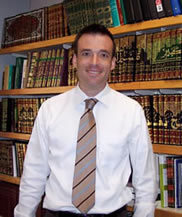
For most students, reading the Quran for an hour may sound like a homework assignment. For Gabriel Reynolds, associate professor of Islamic studies and theology at the University of Notre Dame, and the student members of the Quran Circle reading group, it is an extra-curricular activity with many benefits.
Established in 2004, the Quran Circle began when a few students and faculty members met informally to improve their Arabic in addition to discussing the language and the Quran.
Today the group includes five student members, in addition to Reynolds. The group meets every Friday in Reynolds’ office in Malloy Hall. All students with at least one semester of Arabic experience are welcome to attend.
What is it about this group that has students doing homework for fun?
“The group helps me practice both speaking and comprehending spoken Arabic,” Notre Dame junior Joshua Calton said.
The structure of group meetings is designed to help all participants grow and learn more about Arabic and the Quran. Students take turns reading a passage and then translating it. Reynolds assists, explaining new terms, aiding in pronouncing challenging phrases and even teaching on occasion to help students understand the Quran in context.
“Professor Reynolds also makes an effort to improve our grammar and ability to comprehend a complete passage, despite the presence of unknown words,” Calton said.
Reading and translating, however, is only one part of the group’s purpose.
“The group is meant to challenge students to master the rules of Arabic grammar, but also to be a circle of friends who reflect together on the important literary and religious issues connected to the Quran,” Reynolds said. “Given the many controversies in Quranic study and the close connection between the Quran and the Bible, there is always a topic for group discussion.”
Reynolds hopes the group will grow in the future.
“Ultimately I hope for the group to provide a context where students improve their Arabic and participate in a collegial yet scholarly conversation,” he says. “Thereby the Quran Circle becomes a setting where Muslims and non-Muslims are equal partners in a common intellectual initiative.”
_*Contact:* Gabriel Reynolds, "greynolds@nd.edu":mailto:greynolds@nd.edu_

